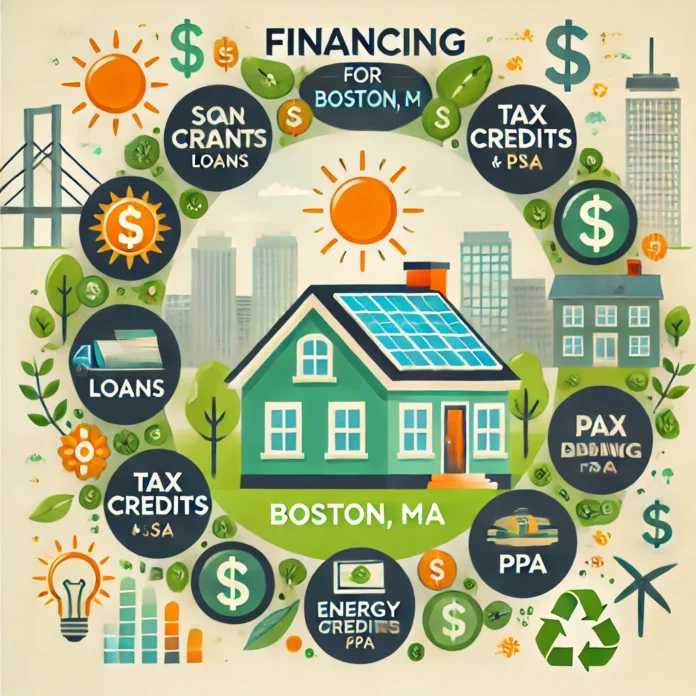Introduction
As the world shifts towards renewable energy, solar power has emerged as a leading solution for sustainable electricity. Boston, MA, with its progressive stance on clean energy, is an ideal city for solar equipment adoption. However, the high initial cost of solar installations often poses a challenge. This guide explores various financing options available for financing of solar equip/boston ma, MA, ensuring homeowners and businesses can transition to solar energy without financial strain.
Why Solar Energy?
Solar energy is not just an eco-friendly choice; it’s also a smart financial investment. Here are some compelling reasons to consider going solar:
- Environmental Impact: Reduces carbon footprint and dependence on fossil fuels.
- Cost Savings: Lowers electricity bills over the long term.
- Increased Property Value: Solar-equipped properties often have higher market value.
- Incentives: Federal, state, and local incentives make solar energy more accessible.
Understanding the Cost of Solar Equipment
The cost of solar equipment varies depending on factors such as system size, installation complexity, and the type of panels used. In Boston, the average cost of a residential solar system ranges from $15,000 to $25,000 before incentives. Here’s a breakdown:
- Solar Panels: $3,000 to $10,000
- Inverters: $1,000 to $2,500
- Installation: $5,000 to $10,000
- Additional Equipment: $1,000 to $2,000
Financing Options for Solar Equipment
Boston residents have several financing options to ease the financial burden of solar installations:
1. Solar Loans
Solar loans allow homeowners to finance their solar systems and pay in installments. These loans can be secured or unsecured, with competitive interest rates.
- Benefits:
- Ownership of the system, leading to long-term savings.
- Eligibility for federal and state tax credits.
- Recommended Providers:
- Massachusetts Solar Loan Program: Offers low-interest loans with flexible repayment terms.
- Local Credit Unions: Many provide solar-specific loans with favorable terms.
2. Power Purchase Agreements (PPAs)
With a PPA, a solar company installs the system on your property, and you pay for the electricity generated, often at a lower rate than utility prices.
- Benefits:
- No upfront cost.
- Immediate savings on energy bills.
- Drawbacks:
- The system is owned by the solar company, so you’re not eligible for tax credits.
3. Solar Leases
Similar to PPAs, solar leases involve renting the system from a provider. Monthly payments are fixed and typically lower than utility bills.
- Benefits:
- Low or no upfront costs.
- Simplified maintenance.
- Drawbacks:
- No system ownership, so no tax credits.
4. Federal Tax Credits
The Federal Solar Investment Tax Credit (ITC) allows homeowners to deduct 30% of their solar installation costs from federal taxes.
- Eligibility Requirements:
- The system must be installed on a primary or secondary residence.
- Installation must be completed by December 31 of the current year.
5. State Incentives in Massachusetts
Massachusetts offers some of the most generous solar incentives in the country:
- SMART Program: Provides fixed payments for every kilowatt-hour of solar energy produced.
- Solar Renewable Energy Credits (SRECs): Homeowners earn credits for the energy generated, which can be sold to utility companies.
- Net Metering: Allows homeowners to earn credits for excess electricity fed back into the grid.
6. PACE Financing
The Property Assessed Clean Energy (PACE) program lets property owners finance solar projects through an assessment added to their property taxes. This option is ideal for businesses in Boston.
- Benefits:
- Long repayment terms.
- Transferable to new property owners.
Choosing the Right Financing Option
Selecting the best financing option depends on your financial situation and energy goals. Consider the following:
- Upfront Costs: If upfront costs are a concern, explore PPAs or leases.
- Ownership Goals: Opt for loans or direct purchases to retain system ownership.
- Tax Benefits: Ensure eligibility for federal and state incentives.
- Long-Term Savings: Evaluate the total savings over the system’s lifetime.
Steps to Secure Solar Financing in Boston
- Assess Your Energy Needs: Determine the size and type of solar system required.
- Research Providers: Compare local solar installers and financing options.
- Apply for Incentives: Take advantage of federal and state programs.
- Review Loan Terms: Ensure interest rates and repayment terms align with your budget.
- Sign Agreements: Carefully review contracts for leases or PPAs.
- Install the System: Work with a trusted provider to complete the installation.
Conclusion
Financing solar equipment in Boston, MA, is a strategic investment in a sustainable future. With numerous options—from loans and leases to federal and state incentives—residents and businesses can adopt solar energy with ease. By understanding the costs, benefits, and available programs, you can make an informed decision and join the clean energy movement in Boston. Take the first step today and explore the possibilities of solar financing for a brighter tomorrow.
